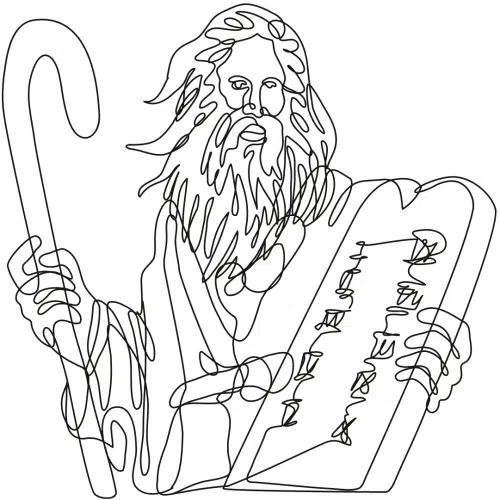There are no original New Testament manuscripts in extant. The oldest copies of the New Testament are Greek, dating from the late second century. By this time in history, in all Greek manuscripts, both Old and New Testament, the Tetragrammaton, the four letter name of God, does not appear. Rather, it had been replaced with the Greek word for Lord (kurios) in an abbreviated form known as Nomina Sacra (a shortened two-letter abbreviation in Greek used for sacred names of God and Christ, where the first and last letter are written with an over line above the letters). 1
Also, there are no early Hebrew New Testaments. Even though several early church fathers indicate that a few of the New Testament books may have been originally written in Hebrew, none of these manuscripts are known to exist.2 Early on in the Christian church, a great schism came between Judaism and Christianity. This division became greater as Christianity merged with the Roman government and became the official religion of the Roman Empire. Yet, the majority of the New Testament was written by men of Jewish background.
Historically, very little interest has been shown in a Hebrew translation of the New Testament. Finally, in 1817, the “London Society for Promoting Christianity amongst the Jews” published one of the first Hebrew New Testaments. Then in 1838, Franz Delitzch, a German Lutheran theologian and Hebraist, requested that a New Hebrew translation be made as the 1817 version had numerous errors. Not until 1864 was the work finally approved, and Delitzch began the task of producing a Hebrew New Testament. The main text from which this translation was made was the Greek Textus Receptus. However, during this time in history, the Siniatic Codex had been discovered, and the final translation drew from these older codices. Delitzch continued to work on revisions and criticisms until his death in 1890. His work was then committed to an associate of twenty years, Dr. Gustaf Dalman, who completed the final edition.
In all of the early Greek writings from which this Hebrew New Testament was produced, no distinction was made between the name of God, Yahweh, the title of God as Adonay (Lord), or the title for human masters, adon (lord or master). Therefore, when translating the word kurios, these Hebraic scholars needed to use context in order to give the Hebrew understanding properly. Both Delizch and Dalman were interested in evangelizing the Jews. The underlying principle for translation was “that the text should be reproduced as if thought and written in Hebrew.”3 The Hebrew New Testament offers those searching for the name of God an insight into Hebraic thought. In this version, the name of God, Yahweh, occurs 207 times.
Here is every use of Yahweh from the Hebrew New Testament of Franz Delitzch:
Mt 1:20, 22, 24; 2:13, 15, 19; 3:3; 4:4; 4:7, 10; 5:33; 21:42; 22:37, 44; 23:39; 28:2; Mk 1:3; 5:19; 11:9, 10; 12:11, 29 (twice), 30, 36; 13:20; Lk 1:9, 11, 15, 16, 17, 25, 28, 32, 38, 45, 46, 58, 66, 68, 76; 2:9 (twice), 15, 22, 23 (twice), 24, 26, 29, 39; 3:4; 4:4, 8, 12, 18, 19; 5:17; 10:27; 13:35; 19:38; 20:37, 42; Jn 1:23; 12:13, 38 (twice); Ac 1:24; 2:20, 21, 25, 34, 39; 3:19, 22; 4:24, 26, 29; 5:9, 19; 7:30, 31, 37, 49, 60; 8:22, 24, 25, 26, 39; 10:33; 11:21; 12:7,11,23; 13:2, 10, 11, 44, 48, 49; 14:3; 15:17 (twice), 35, 36, 40; 16:14, 32; 19:20; 21:14; Ro 4:8; 9:29; 10:13, 16; 11:3, 34; 12:11, 19; 14:4, 6 (thrice), 8 (thrice), 11; 15:11; 1Co 1:31; 2:16; 3:20; 4:4, 19; 10:9, 26, 28; 11:32; 14:21; 16:7, 10; 2Co 5:11; 6:17, 18; 10:17, 18; Ep 2:21; 5:19; Col 3:22, 23, 24; 1Th 1:8; 4:6, 15; 5:2; 2Th 3:1; 2Ti 1:18; 2:19; 4:14; He 7:21; 8:2, 8, 9, 10, 11; 10:16, 30; 12:5, 6; 13:6; Ja 1:7; 3:9; 4:10, 15; 5:4, 10, 11 (twice), 14, 15; 1Pe 1:25; 3:12 (twice), 15; 2Pe 2:9, 11; 3:8, 9, 10; Ju 1:9, 14; Re 1:8; 4:8, 11; 11:17; 15:3, 4; 16:5, 7; 18:8; 19:1,6; 21:22; 22:5, 6.
Although we have no original Hebrew New Testament, the work of Franz Delitzch to produce a New Testament in Hebrew is truly a remarkable feat. In closing remarks in his article about this work, author Gustaf Dalman wrote, “But would that this new offering of Salvation, in the Hebrew tongue by which Christ who was born from the seed of David according to the flesh, for the second time appears among his people, might prove to be to them not a savor of death, but of life and salvation.”4
1 See Glad Tidings Article Seek Yahweh: Nomina Sacra –the Replacement of God’s Name, September/October Edition, Vol 16, issue 5, page 4
2 The Book of Matthew is mentioned as being written in Hebrew – Eusebius on Papius, Ecclesiastical History, 3.39; Irenaeus, Against Heresies, 3.1; Eusebius on Origen, Ecclesiastical History, 6.25; Eusebius, Ecclesiastical History, 3.24; Epiphanus, Panarion, 29.9.4; Jerome, On Famous Men, 3.5; The book Hebrews is mentioned as being written in Hebrew – Clement of Alexandria, Hypotyposes; referred by Eusebius, Ecclesiastical History, 6.14.2; Eusebius, Ecclesiastical History, 3:38.2-3.
3 Gustaf Dalman, The Hebrew New Testament of Franz Delitzch, The Old and New Testament Student, Vol 15. No. 3 / 4 (Sep-Oct, 1892), The University of Chicago Press, p 148. Downloaded from http://www.jstor.org/stable/3158076 on 11/10/2011.
4 Ibid., P. 152




0 Comments